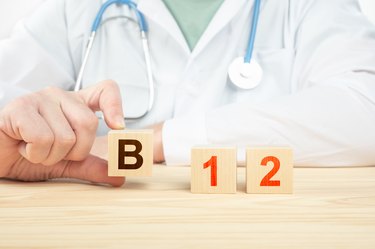
Vitamin B12 deficiency can have a significant impact on everyday health, negatively affecting gastrointestinal function, DNA synthesis, neurologic processes and mood regulation, according to the Linus Pauling Institute at Oregon State University. Common delivery methods for supplementation include injection, oral tablets and dissolvable lozenges that are sublingual (taken under the tongue).
All of these delivery methods fight vitamin B12 deficiency, but some are more effective than others. Read on to learn more about vitamin B12 deficiency and the supplement forms and doses that can help return B12 (aka cobalamin) levels to normal.
Video of the Day
Video of the Day
Who Is Vitamin B12 Deficient?
Vitamin B12 deficiency can cause irreversible nervous system and neurological damage if left untreated. It can also lead to elevated homocysteine (amino acid) levels in the blood, a risk factor for cardiovascular disease, stroke and dementia, according to the Cleveland Clinic.
Thankfully, vitamin B12 deficiency is considered uncommon in healthy adults. The body stockpiles B12 and uses it slowly; therefore, small intakes are usually sufficient to maintain adequate vitamin B12 levels, per Linus Pauling.
However, they note that certain people are at an increased risk of B12 deficiency. They include:
Vegans and Vegetarians
As a review on vitamin B12 deficiency published in the September 2021 International Journal of Molecular Science (IJMS) notes, the main dietary sources of vitamin B12 are dairy and meat products, including liver, eggs, shellfish, chicken, trout and various cheeses. Therefore, people who do not eat a significant amount of dairy or animal-based foods (such as vegans and vegetarians) are at an increased risk of vitamin B12 deficiency.
People Aged 60+
Absorption of vitamin B12 from food requires normal function of the stomach, pancreas, and small intestine, and these organs may become impaired with age.
People with Certain Health Conditions
There are many health conditions that can hinder vitamin B12 absorption, increasing the risk for vitamin B12 deficiency. Individuals at high risk for vitamin B12 deficiency include those with atrophic gastritis, pernicious anemia, celiac disease, pancreatic insufficiency, those who have had gastrointestinal surgery, and those who suffer from alcoholism, per Linus Pauling.
What Forms of B12 Are Available?
Vitamin B12 supplementation comes via a variety of delivery methods. They include but are not limited to:
Sublingual Lozenges
These are placed directly under the tongue. They dissolve in the saliva, and the body absorbs the vitamin B12 through the tissues in the mouth.
Intramuscular Injection
B12 shots are an even more direct method, delivering the vitamin B12 straight into your bloodstream.
Oral Tablets
Since they're taken by mouth and swallowed in the same way as food, vitamin B12 pills must first be broken down in the stomach before the B12 can be absorbed by the small intestine and thus make it into the blood.
Tip
Vitamin B12 supplementation comes in a variety of delivery forms, doses and price points. Before beginning treatment, consult your doctor to determine the best B12 supplement method for your needs.
Which Delivery Method Is Best?
Many people prefer a sublingual vitamin B12 supplement to an injection. Injections require you to draw up the medication and endure the mild pain associated with getting a shot. Taking vitamin B12 sublingually, by contrast, is as simple as placing a quick-dissolving tablet under the tongue.
That said, research from the IJMS indicates that the "best" form of B12 may depend on what's causing the deficiency in the first place. If the cause is "prior gastrectomy, bariatric surgery, achlorhydria, pancreatic insufficiency, short bowel syndrome, bacterial overgrowth, or inflammatory bowel disease," say researchers, "the administration of hydroxocobalamin [1-milligram intramuscular injection] every two to three months for life is recommended."
In cases where the deficiency is thought to be diet-related, however, "people should either take oral cyanocobalamin tablets 50–150 micrograms daily between meals or have a twice-yearly hydroxocobalamin 1-milligram injection. In vegans, treatment may need to be life-long, whereas in other people with dietary deficiency, replacement treatment can be stopped once the vitamin B12 levels have been corrected and the diet has improved."
Researchers from Italy who were studying B12 deficiency in vegetarians and vegans found that daily supplementation with 50-microgram sublingual tablets was enough to restore B12 and homocysteine levels to normal, according to a randomized controlled trial published in the April 2019 issue of Clinical Nutrition. Large, once-weekly doses of 2,000 micrograms, they found, were poorly absorbed.
Meanwhile, a comparative study of 4,281 patients published in the June 2019 issue of the journal Drug Delivery and Translational Research found that post-supplement B12 levels were "significantly higher" in the group that had received the B12 via sublingual tablets vs. shots. Those researchers concluded that sublingual preparations are "superior" to injections and "should be the first line option for patients with [vitamin B12 deficiency]."
Finally, it's important to note that diseases like pernicious anemia can drastically reduce your body's ability to orally absorb vitamin B12, according to the National Institutes of Health. You could treat this condition with an oral B12 supplement, but you would need to take a much higher dose to meet your daily needs, so an injection may be preferable.
In cases of B12 deficiency due to aging, sublingual and injected vitamin B12 are both effective treatments.
- Linus Pauling Institute: "Micronutrient Information Center — Vitamin B12"
- Drug Delivery and Translational Research: "Comparison of Sublingual vs. Intramuscular Administration of Vitamin B12 for the Treatment of Patients with Vitamin B12 Deficiency"
- International Journal of Molecular Science: "A Brief Review on Vitamin B12 Deficiency Looking at Some Case Study Reports in Adults"
- Cleveland Clinic: "Homocysteine"
- Clinical Nutrition: "Effect of Two Different Sublingual Dosages of Vitamin B12 on Cobalamin Nutritional Status in Vegans and Vegetarians with a Marginal Deficiency — a Randomized Controlled Trial"
- National Institutes of Health: "Vitamin B12"